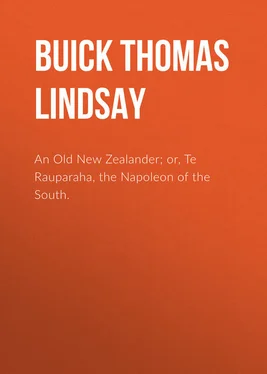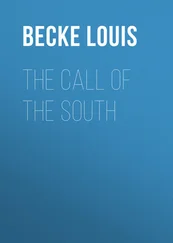Thomas Buick - An Old New Zealander; or, Te Rauparaha, the Napoleon of the South.
Здесь есть возможность читать онлайн «Thomas Buick - An Old New Zealander; or, Te Rauparaha, the Napoleon of the South.» — ознакомительный отрывок электронной книги совершенно бесплатно, а после прочтения отрывка купить полную версию. В некоторых случаях можно слушать аудио, скачать через торрент в формате fb2 и присутствует краткое содержание. Жанр: foreign_antique, foreign_prose, на английском языке. Описание произведения, (предисловие) а так же отзывы посетителей доступны на портале библиотеки ЛибКат.
- Название:An Old New Zealander; or, Te Rauparaha, the Napoleon of the South.
- Автор:
- Жанр:
- Год:неизвестен
- ISBN:нет данных
- Рейтинг книги:3 / 5. Голосов: 1
-
Избранное:Добавить в избранное
- Отзывы:
-
Ваша оценка:
- 60
- 1
- 2
- 3
- 4
- 5
An Old New Zealander; or, Te Rauparaha, the Napoleon of the South.: краткое содержание, описание и аннотация
Предлагаем к чтению аннотацию, описание, краткое содержание или предисловие (зависит от того, что написал сам автор книги «An Old New Zealander; or, Te Rauparaha, the Napoleon of the South.»). Если вы не нашли необходимую информацию о книге — напишите в комментариях, мы постараемся отыскать её.
An Old New Zealander; or, Te Rauparaha, the Napoleon of the South. — читать онлайн ознакомительный отрывок
Ниже представлен текст книги, разбитый по страницам. Система сохранения места последней прочитанной страницы, позволяет с удобством читать онлайн бесплатно книгу «An Old New Zealander; or, Te Rauparaha, the Napoleon of the South.», без необходимости каждый раз заново искать на чём Вы остановились. Поставьте закладку, и сможете в любой момент перейти на страницу, на которой закончили чтение.
Интервал:
Закладка:
The first important halt was made at Manu-korihi, on the north bank of the Waitara River, where a stay of some length was made for the purpose of finally determining the order of their plans. The Manu-korihi people became deeply interested in the muskets which the visitors had brought with them; and curious to observe their effect – at the expense of some one else – they persuaded Te Rauparaha and his friends to commence hostilities against the famous Puke-rangiora pa , whose inhabitants had been guilty of some cause of offence. The invitation to attack the great stronghold was accepted with alacrity; but when the war party presented themselves before the walls, they found it so strongly fortified and so keenly defended that discretion dictated a less valiant course, and so they passed Puke-rangiora, and went over the mountain track to Te Kerikeringa in search of a meaner enemy. This pa was a central point in the system of defence set up by Ngati-Maru, who had established populous settlements and made great clearings in the forest east of the present town of Stratford. Their great fighting chief was Tutahanga, who in former days had subdued the pride of both the Waikato and the Nga-Puhi. Now he was old, but his martial bearing was still such that, when the invaders inquired of their guides how they might distinguish him from those of inferior rank, they were told, "He is a star."
Graced by the red plumes of the tropic bird, the northerners moved up to the attack, but were met with so stout a resistance by the defenders, who had donned the white feathers of the sacred crane, that, in spite of their muskets, their combination broke, and they retired in disorder to the western slopes, where they were compelled to resort to the tactics of a regular siege. From these heights, which dominated the pa , they were occasionally able to shoot down an unwary defender who exposed himself to their fire; but they did not rely entirely upon this method of fighting to effect their conquest. Frequent assaults were made upon the gateway, in one of which they succeeded in shooting Tutahanga, and in another Patu-wairua, his successor in command. Before his death, Patu-wairua, persuaded that the pa could not hold out much longer, desired to make peace if possible; but his conciliatory views were overruled by the less diplomatic leaders of the tribe. Patu-wairua then sat down and sang a lament for his people, whose impending fate he deplored with all the affection of a father. In the next sally he was killed in the fore-front of the fighting line, bravely sustaining the unequal contest, in which the mere was matched against the musket.
With their two great leaders gone and many of their tribesmen dead, a feeling of depression settled down upon the garrison, whose position was daily growing less secure. But while they were sinking under the weariness begotten of incessant vigilance, a Maori-like episode occurred, in which the arts of the women were employed to do that in which the stalwart arms of the men had failed. As a last device, the Ngati-Maru generals hit upon the idea of sending all the young women of the pa into the camp of the invaders, to beguile the warriors with their charms, and so induce them temporarily to relax the severity of the siege. History does not record the fate of these maidens of Te Kerikeringa; but they deserve at least a certain immortality. For during the diversion thus caused the pa was silently evacuated, the survivors of the siege making their escape across the Waitara River along the Tara-mouku Valley, and through the dense forest which stretched for many miles into the heart of the island.
The tidings that Kerikeringa had fallen spread with such rapidity that, before the rejoicings of the victors had concluded, the tribes to the southward had succeeded in concealing themselves within their mountain fastnesses. Consequently we hear of no conflicts with Ngati-Ruanui or Nga-Rauru, as the victorious taua passed over the old forest track which leads out into the open country near the town of Normanby. This peaceful passage was not interrupted until they reached the Whanganui River, where they found the resident tribes drawn up in battle array to oppose them at the Turua pa . This pa was situated on the eastern bank of the river, a little above the present town of Whanganui; but, in reaching it, the northerners were faced with a serious initial difficulty, inasmuch as they had no canoes of their own, and Te Anaua, of Whanganui, had taken the precaution to remove his flotilla to the opposite shore. But the ingenuity of Tuwhare and Te Rauparaha was equal to an emergency of that kind. Ordering their men into the neighbouring swamps, they employed a month in cutting dry raupo leaves, out of which they constructed a mokihi fleet, and on these vegetable rafts the whole force was eventually transported across the wide and deep river. The capture of the pa was a work of no great difficulty; for here, as elsewhere, the muskets exercised their terrifying influence upon natives coming into contact with them for the first time.
Southward the march was once more directed, and skirmishes followed with Ngati-Apa in the Whangaehu and Rangitikei districts. No protracted fighting was possible where the panic-stricken inhabitants fled before the all-destroying guns. Across the Rangitikei the taua passed into the fertile district of the Manawatu, which since the traditional days of Whatonga had been the home of the Rangitane people. Of this hostile descent upon the coast the Rangitane people declare that they, secure in their mountain fortresses, heard nothing until the arrival of the war party at Otaki. Thither some of the children of Toki-poto, the chief at Hotuiti, near Awahou (Foxton), had gone on a visit to their friends; and there they met Te Rauparaha, who inquired of them the whereabouts of their people and the number and strength of their pas .
The patronising and fatherly demeanour which this warrior could assume 39 39 The late Hon. J. W. Barnicoat, who knew Te Rauparaha well, has assured the writer that when it suited him the wily old chief could "lend a most angelic expression to his countenance."
when his ends were better served by the concealment of his true purpose completely won the confidence of the lads, and, in their innocence of the man, to whom they were confiding the secrets of the tribe, they readily told him all that he wished to know. When the desired information had been obtained some of Te Rauparaha's followers proposed, as a precautionary measure, that the children should be killed; but Te Rauparaha, more far-seeing than they, interposed, for he had not yet exhausted their usefulness. In the depths of his cunning he had conceived the idea of making the children of Toki-poto the instruments by which that chief should be delivered into Ngati-Toa's hands. Accordingly, he resisted the demand for their blood, saying, "No, let them alone, they are only children. Rather let us go and take Toki-poto out of the stern of the canoe." This was his expressive and figurative method of conveying to his warriors that he sought a more valuable trophy than the life of a child, and that he had resolved upon no less a scheme than the assault of the Hotuiti pa . To Mahuri, the eldest son of Toki-poto, he then turned, and in dulcet tones he said, "Go to your father, I will see him."
Accompanied by the Ngati-Toa warriors and their leader, the lad led the way to a small lake pa at Hotuiti, whither Toki-poto had gone with the major portion of his people from their main settlement on the banks of the Manawatu River. The pa itself was built on one of the many miniature islets which dot the face of the lake; and, while Te Rauparaha and his followers lurked in the bush which fringed the margin, he sent the unsuspecting Mahuri to tell his father that Te Rauparaha wished to talk with him. The first thought to arise in the mind of the Rangitane chief was one of suspicion, and he at once exclaimed, "No, I will not go. I shall be slain." But the boy, into whose good graces Te Rauparaha had completely ingratiated himself, ridiculed these fears, and urged his father to go. To these entreaties, and possibly to fears of retaliation if he did not comply, Toki-poto at last yielded, and, taking a few of his people with him, went in his canoe, unarmed, to welcome his visitor.
Читать дальшеИнтервал:
Закладка:
Похожие книги на «An Old New Zealander; or, Te Rauparaha, the Napoleon of the South.»
Представляем Вашему вниманию похожие книги на «An Old New Zealander; or, Te Rauparaha, the Napoleon of the South.» списком для выбора. Мы отобрали схожую по названию и смыслу литературу в надежде предоставить читателям больше вариантов отыскать новые, интересные, ещё непрочитанные произведения.
Обсуждение, отзывы о книге «An Old New Zealander; or, Te Rauparaha, the Napoleon of the South.» и просто собственные мнения читателей. Оставьте ваши комментарии, напишите, что Вы думаете о произведении, его смысле или главных героях. Укажите что конкретно понравилось, а что нет, и почему Вы так считаете.











